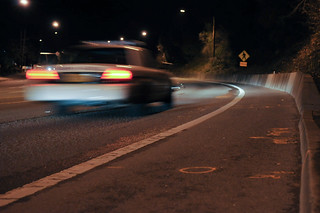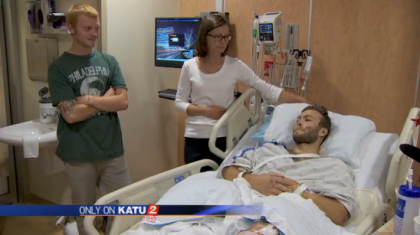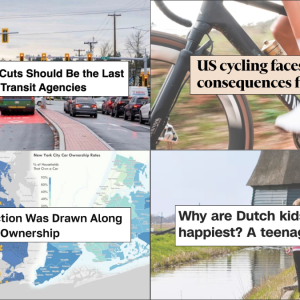
driver doesn’t decide to flee a crash.
(Photo: J.Maus/BikePortland)
Nobody expects to kill a person with their car. This means that the moment you do, your only basis for decision is usually something you heard once from a friend.
And as Portland deals with two major recent hit-and-run cases involving people on bikes, some victim advocates are saying that Oregon needs to do more to spread the idea that it’s morally reprehensible to flee the scene of a collision.
“What’s happened is that Mothers Against Drunk Driving and all these other great organizations have done incredible work over the last 20 years,” Joshua Shulman, a Portland lawyer who works on civil injury cases and has researched the topic, said Friday. “And I’m so glad that they have, because drinking and driving is awful. But one of the side effects of harsh penalties is to make people more likely to avoid them.”
“Drinking and driving is awful. But one of the side effects of harsh penalties is to make people more likely to avoid them.”
— civil injury lawyer Joshua Shulman
In many hit-and-run cases, Shulman said, that’s exactly what happens: a person driving drunk hits someone, panics, heads home and only turns themselves in after sobering up.
“If you leave the scene, it’s shockingly easy to get away with avoiding the DUI,” he said. “The person must have been drinking. People just don’t do this sort of thing if they’re not drunk. But what are you supposed to do? You ask them ‘Were you drinking?’ They say no. Are you supposed to take their photo to every bar in Portland?”
Oregon’s criminal code actually makes few distinctions between leaving the scene of a fatal crash and criminally negligent homicide or second-degree manslaughter, the two likeliest charges for fatal DUIIs. All three are Class B felonies.
But due in part to the successful effort by MADD and others to stigmatize drunken driving, Shulman said judges and juries are more likely to be lenient, unless there’s a DUII conviction (which by law can’t be plea-bargained away).
The result: a perverse incentive, despite the criminal code, for one Oregonian to leave another one bleeding on the street.
“There is a focus on drunk driving, there is now a focus on texting and phoning and all of that, but there’s never been a focus on hit-and-run,” said Kristi Finney of Vancouver, who has devoted much of her life to street safety advocacy after her son Dustin was killed in a hit-and-run on Division Street in 2011. “Some people sympathize with people who hit and run.”
Finney’s case shows another perverse incentive for Oregonians to hit and run: to avoid conviction altogether. Although the man who pled guilty to killing her son only evaded arrest for a few minutes, that window was enough for law enforcement to conclude that they couldn’t be certain of conviction, leading to a plea deal that reduced the driver’s minimum prison sentence.
Hit-and-runs accounted for about one in 20 Oregon injury collisions in 2010 and 2011, according to statistics requested from the state by Shulman’s law office.
Finney, who has worked with Shulman to launch a new website about hit-and-run victims, has tried to mobilize other victims’ families for a MADD-like movement, with little success.
“My thought is that my little voice does practically nothing, and if we can just get a bunch of us together to be a huge voice,” Finney said. “But I just simply cannot get a response from other families. … Some people want to get over it. I don’t want to get over it. I want to get out there and prevent it.”
“It’s almost worse for families of hit and runs than drunk drivers,” said Maureen Inouye, client relations manager for Shulman’s law firm. “There’s not closure.”

(Image from KATU video)
Shulman supports making Oregon’s criminal penalties for hit-and-run clearly higher than for DUII, so people will know that you’re always better off staying at the scene.
But he said legal changes — like one passed this year, which upped the civil penalty for an injury hit-and-run from a one-year license suspension to a three-year suspension — won’t be enough on their own.
“Hardening the law would help, but also the whole concept of what it means to drive a car needs to change,” Shulman said. “We think of it as just getting to work, like it’s nothing. We need to realize that it’s a huge responsibility. … Leaving just should be completely unthinkable.”
Changing the way people think, though, can be the hardest task of all.
“With drinking and driving, one of the things that happens is people drink so often — there’s just millions and millions of people making a decision about that issue very day,” Shulman said. “Whereas with hit and run, people are only in that position if they hit someone. It’s something that most people will never face in their entire lives, and most people [who do] will only do it once. What MADD was able to do was put drunk driving on people’s minds every time they have a drink. I don’t know how to do that with hit-and-run.”
——
Further reading: Why people flee the scene of hit and runs (published here on January 26th, 2012)
— A note from the publisher: This story is part of a new effort here at BikePortland to bring you more, in-depth and original reporting on important issues here on the Front Page. Stay tuned for more stories like this in the weeks to come. — Jonathan








Thanks for reading.
BikePortland has served this community with independent community journalism since 2005. We rely on subscriptions from readers like you to survive. Your financial support is vital in keeping this valuable resource alive and well.
Please subscribe today to strengthen and expand our work.
drinking and driving = bad
texting and driving = bad
driving and running away = needs work to be recognized as very bad
What do all of these have in common? Oh, yeah. DRIVING.
“the whole concept of what it means to drive a car needs to change”
Yep.
“the whole concept of what it means to drive a car needs to change”
That pedestrians have the right of way in many situations indicates to me that in an earlier time automobiles’ right to use the public space was supposed to be subordinate to other users. The automobile, new on the scene, was allowed in as a guest only if it fits itself into the environment. As the pedestrian became the minority, the culture allowed autos to be the owner of the roads, not the guest on them. But many of the laws remain from before that shift – they are on the books, but unenforced.
Peter Norton’s book Fighting Traffic is all about this. I highly recommend it.
“Shulman supports making Oregon’s criminal penalties for hit-and-run clearly higher than for DUII, so people will know that you’re always better off staying at the scene.”
I’m not convinced that making hit-and-run penalties higher than DUII penalties will make people want to stay at the scene. Do people flee because they’re afraid of getting a DUII charge, or do they flee because they think they’ll get away with the whole thing (drunk or not)?
“they think they’ll get away with the whole thing ”
They not only probably think that. They would be right. Didn’t we read here recently about statistics in LA w/r/t hit and runs? It was mind-blowing.
This is definitely also a factor – and not one with a clear legislative fix, unfortunately. As for LA’s hit-and-run epidemic, 20/20 actually went into detail on that last night: http://abcnews.go.com/US/inside-detectives-fight-las-hit-run-crisis/story?id=20024583
I think the thought process would still be different. I can leave, and even if they catch me, the penalty will be lighter/ the same as the dui vs I can leave, and I might get away with it, but if they catch me, the penalty will be worse than the dui.
Some people will still try and run but you need to change the risk to reward ratio of running.
Question: when police tell you to look for such-and-such vehicle involved in a hit and run, what are we supposed to do?
report every sighting matching the description?
That white 1993 Ford F-350 crew cab with chrome steps seems everywhere. And most have body damage due to age.
Of course I agree with the article, but, personally, I’m more interested in how people behave before driving into a vulnerable user than I am in what they do afterwards. I think prosecution does have some preventive effect, but not enough to have a major effect on drivers’ culture of entitlement.
Maybe I’m wrong but I believe that strict enforcement of existing traffic laws (speed, yielding, distraction, etc) would save more lives and make people feel safer. I also think the laws should be different for a 100 pound vehicle at 15 mph than a 3000 pound vehicle at 30 mph.
I’d gladly let them raise my taxes to double the police force and ticket drivers for ALL illegal activity instead of sitting lazily on the side of the road with a radar gun…
One thing we do NOT need in this country is more police force. We are way too militarized as it is. The police force is large enough, particularly with homeland security. Their resources just need to be redirected. The money used to pay for the extra police (including pensions, health insurance ect….) would be better served in making the infrastructure on main arterials safer. These are where hit and run’s tend to happen.
This is a cultural change that needs to happen.
We need to take a lesson from Europe and revoke a person’s driver’s license EASILY, for LIFE when they do dumb things. Driving on a suspended, revoked for life, drunk driving…same thing. Three speeding tickets over 10 MPH over the limit within five years…revoked for life. Over the course of the next generation the “Darwin effect” will take all the licenses away from all the idiots.
Of course you will always get a few driving on a revoked…which if caught gives you prison time. That would be a much better use of our tax dollars than using the police to harass the homeless in this city like is currently happening.
Couldn’t traffic law enforcement be done by a non-militarized agency? Seems the function could be filled by unarmed agents, similar to parking patrol, who would not have direct contact with the drivers. If urgent matters are observed they could contact the armed forces, er, police.
For that matter, why not privatize enforcement, similar to red light cameras? Put private enterprise to work for the public good.
The entire police force of England (unless the riot police is called in) is non-militarized. They do not even carry firearms. We do not need to add ANY more security in this country, of any kind.
Now, automated speed technology with digital license plate and facial recognition technology along high crash corridors. Sounds like a great idea…automatic tickets, then automatic revocations for repeat offenders. You should always have the right to BE on public roads, but it is not a right to DRIVE on public roads…that is a privilege we are way too free with in this country.
There are so many lemmings that seem to prefer the soulless, digital version of social control.
God help us, one and all……..(and I am a atheist, btw.)
Just saw the rundown of Miriam Ann Clinton’s driving violations at Oregon Live. It’s ridiculous that she kept getting her license back even after driving with it suspended. You are right. Jail time would have prevented this hit and run….
http://www.oregonlive.com/portland/index.ssf/2013/08/lake_oswego_driver_had_four_su.html
I’m not convinced that MADD has made any difference at all… I can’t find any data on drunk driving fatalities before they were founded… and all the fatality graphs show that there was a steady and sharp decline in fatalities for the decade before MADD came along, making it seem like they stopped the decline in fatalities…
1972 to 1982 shows a huge decline in traffic fatalities… 1982 on is a fairly tame decline… something happened around 1982 that stopped making driving get safer…
all anecdotal…
MADD says that drunk driving deaths are half of what they used to be… maybe driving drunk made people better drivers when they weren’t drunk… seat belt campaigns were also hot in the early 80’s… are seat belts killing people? maybe we drive worse knowing that a seat belt will hold us in…
…
as I once read, when cars are finally designed so that people’s legs hang out over the front bumper then we’ll stop seeing so many collisions…
I’ve never been terribly convinced of MADD’s effect either.
If you look at fatalities by VMT there’s been a pretty steady decline in the rate since 1921 with only a couple anomalies. It’s hard to say how many are caused by drunk driving since no one was tested until about the time MADD was around, but I would place good odds that the ratio of ones involving drinking to the ones not involving drinking has stayed pretty close over time.
What MADD has done is increase the chance that the police will check the driver for intoxicants. So there’s a little more data available about drunk driving, and how many fatalities involve intoxicants. I guess that’s useful.
What MADD has also done is make alcohol the scapegoat of dangerous driving, though texting and cell phones is becoming the new one. It all detracts from the fact that driving in general is dangerous and even the most alert and experienced driver can become distracted for a second and end up seriously injuring or killing someone.
What is absurd about that is that I can’t opt out of most of that risk even if I choose to not drive I’m still surrounded by other people who are. Crossing the street is literally the most dangerous thing I do every day.
“Although the man who pled guilty to killing her son only evaded arrest for a few minutes, that window was enough for law enforcement to conclude that they couldn’t be certain of conviction, leading to a plea deal that reduced the driver’s minimum prison sentence.”
Pretty sure this is because a good lawyer would argue that there’s no way the cops could prove he didn’t start drinking immediately after the accident, in the minutes between after he hit the guy and before they tracked him down. I know this defense/loophole has worked before (multiple times)… despite the insane/illogical reasoning involved in it.
And I wonder why legislation can’t just be written eliminating this defense, and making it so that if you DID hit someone sober, drove off, went home and downed a six pack in the ten minutes it took the cops to run your license plate, you’re considered tough-luck DUII for the purposes of the state you were in before the accident.
Am I losing my mind or did the title of this post change?
Yes. It changed. I didn’t like the original one so I changed it. Sorry if it causes any confusion.
Hi, Lyle. The DUII wasn’t the issue at all in our case. It was that nobody saw the driver. The witnesses were behind the vehicle… but I have heard of that defense. After all, a drink might calm nerves after you hit someone and leave them on the road like a possum.
Because of a failed attempt with a shoe bomb, we all have to take our shoes off at the airports. We all have to go through metal detectors and have our luggage screened. But we do nothing to detect drunk drivers. How about random sobriety stops like they use in civilized countries?
I’m ready to give up this little bit of freedom on the roads for a real problem that kills 1500 people per month in the US. I already experience worse inconvenience for the statistically safer act of flying and the security actions that cost me $5 per flight and half an hour of waiting in the security line.
“We need to take a lesson from Europe and revoke a person’s driver’s license EASILY, for LIFE when they do dumb things. Driving on a suspended, revoked for life, drunk driving…same thing. Three speeding tickets over 10 MPH over the limit within five years…revoked for life. ”
This sounds fantastic. Can you post any links with more details? Which countries, specific laws, etc.
I am just going with what I learned years ago about the driver’s license system, particularly in Germany. Who knows now if things have changed with the EU system in place, but I expect they have not. Driver’s licenses are expensive, hard to get, and easily revoked. They also have an excellent public transportation system so no one feels guilty about “forcing someone” to “take the bus” or having to give work exceptions, which everyone abuses, to those who should not be on the roads.
Dibbly’s 5-part Hit & Run Prevention Proposal: 1. Mandatory jail time. 2. Presumed DUII. 3. Forfeiture of the vehicle. 4. Wages 25% garnished for life, to be transferred to the victim(s). 5. Forehead tattoo, to be selected by the readership of BikePortland.
http://www.youtube.com/watch?v=p5ZkdHImCuQ
The penalty for hit and run needs to be more severe than for drunk driving. Even if you turn yourself in the next day. Because if it isn’t there is no incentive for a drunk driver to not leave the scene (other than basic human decency, which if they possessed any, they wouldn’t be driving drunk) and perhaps report it the next day if they knew they were going to be caught anyway. Then they are better off not getting the DUI and getting a leaving the scene. That is a disgrace.
The law should be written that leaving the scene will be considered prima facie or res ipsa loquitur (whichever the hell would apply) that the driver was DUI. No if ands or buts.
It’s the not cars, the drivers or the drink individually that’s the real problem. It’s the criminally insane idea of the typical U.S. suburb! It has made the automobile a virtual necessity and turned neighboring cities into rotting concrete mazes of highway to accommodate them. See the Portland riverfront for an example. It’s just not practical to travel from one end of any U.S. city to the other in a reasonable amount of time without a car, and sometimes not even then. Even if the bus or tram stopped anywhere near where a person lives, chances are it’s a roundabout route and requires a lot of walking and confusing and expensive transfers. People avoid the bus because it’s inconvenient and take it if no other alternative exists, and this is a shame. Here is a list of practical and inexpensive solutions to the problem:
1) Prohibit bars from having parking lots.
2) Demolish subdivisions with no sidewalks or supermarkets or social halls or restaurants.
3) Monorail.
I lived in Germany for several years. Public transportation there is second to none, making walks short on streets with well-lit sidewalks and many rural neighborhoods have places to socialize without having to travel at all. This combined with strict licensing requirements and stiff penalties make cars a decision many people do not even need to make. The ones that have cars generally respect the law with rare exceptions.
I’m originally from the East coast, and we have many rural roads with single family homes with driveways but no sidewalk, and nothing but other single family homes for miles in any direction. Towns all look alike because they have converted to become six lane highways with fast food and strip malls on either side and little else. The bright side is someday when there are no cars these would become fabulous routes for light rail, so the jokes on us.
They need to use the same logic for motor vehicles as they do for firearms. If someone gets shot and they find you in possession of the gun a few minutes (or a couple of hours) later you are assumed to have been the shooter unless you can provide a rock-solid alibi. None of this “I loaned it to a friend” BS, if you’re driving a car with damage shortly after a hit-and-run. If firearms were as deadly as motor vehicles (or even half as deadly as some people think) then we would be swamped by people killed in shootings. Instead we are swamped in people killed and maimed by motor vehicles.
I think exactly the same thing.
One thing our legal / traffic safety / enforcement system is missing is training post DUI drivers with life transportation skills that do not require operating a motor vehicle. As a society we have often only given them drivers ed in school.
Please someone write a a grant to provide this population with cycling and transit skill set (a create a commuter type program). Without such…there is little wonder why many return to the drivers seat.
I can offer one specific data point around this. In Corvallis a woman named Amy Stack who had previously participated in a diversion course after being caught drinking and driving hit and killed Robin Jensen while she was riding home from work. Stack did not stop at the scene and instead went home and ordered a pizza. She dripped marinara sauce on the car while inspecting the damage and then after her father hired her a lawyer and the police/community spent several days looking for the car that she had hidden in her garage she turned herself in reporting that she had hit a deer or other large animal. She ended up serving only around 9 months in jail and then was permitted to leave the state. I have a hard time believing that if someone previously convicted of a DUI was found drunk at the scene of an accident where they killed someone that they could possibly end up with such a short sentence. Police attempted to find witnesses to show that Stack had been drinking but several days had passed and they weren’t able to find any proof. In the Stack case the victim died immediately but in a case like that of Miriam Clinton where it appears she left someone for dead I wonder what might have happened had a bus driver not been so observant. To me hit and run is even worse than DUI because it has the potential to turn a serious accident into a deadly accident. Perhaps this story is correct and the letter of the law is that they are the same, but in practice DUI seems to clearly be punished more severely, even though in my experience hit and run is often just another very scary piece of a DUI. I mean seriously why would you run if you weren’t drunk? As long as you are sober it is likely you will walk away with a 2-3 hundred dollar traffic ticket at worst even if you kill someone.
I had read about Robin’s story previously but not with all the details you had. WOW. Joshua and I both believe that hit-and-run penalties need to be at least as severe as DUII. We believe that there should be a presumption that the driver who hit-and-runs is ALREADY doing something illegal even before hitting someone. Here is a link to my testimony before the Senate Judiciary Committee in May 2013.https://olis.leg.state.or.us/liz/2013R1/Downloads/CommitteeMeetingDocument/21390. Thanks so much for your feedback.
If they started focussing on hit &run as much as they are texting while driving I think it would help out a lot.